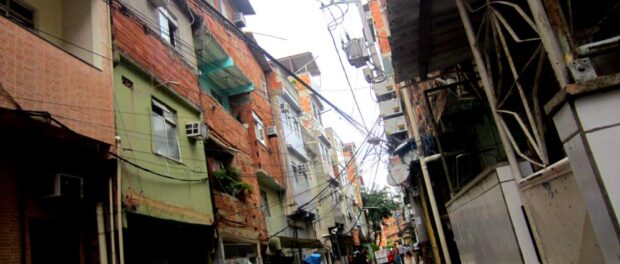
The last year, 2017, brought immense pressure to the West Zone favela of Rio das Pedras as Mayor Crivella’s Strategic Plan marked it for a verticalization project to replace existing homes with high-rise apartment buildings. Barely weeks into the new year, Rio das Pedras residents are once again feeling the pressure—this time from the municipal electric utility, Light. After enjoying time with family and friends for the holidays, residents were shocked to receive electric bills reaching up to R$400, R$500, R$600 (US$125-187) and beyond. One resident even posted a photo on Facebook of an electricity bill for over R$1,000 (around US$312); this bill was for a kitchenette—a micro apartment with basic amenities.
It is important to note that this has been a widely experienced phenomenon in recent years. Favelas across Rio de Janeiro that have received new electric measurement systems have subsequently experienced skyrocketing electricity prices. In Rio das Pedras’ case, however, this extreme financial burden is adding to residents’ existing fear that despite saying there would be no evictions, the City still plans to level and reconstruct the neighborhood, leaving existing residents vulnerable. And given the city’s history shutting off the lights to instill fear and desperation to weaken the resolve of communities it seeks to evict, the relationship between utility access and eviction is already well known.
“The bills are coming in more expensive than the actual rent in the community. It’s really hard because the people don’t use air conditioning. Most of them leave for work in the morning and return at night. It’s not an isolated complaint from one or two residents, it’s a majority of the residents, if not all,” noted Andréia Ferreira, a member of the new Rio das Pedras Commission that formed to combat the threat of eviction. “Some people have already left Rio das Pedras because they can’t afford to pay. Many are living in the dark.”
After beginning to regularize Rio das Pedras’ energy grid in 2014, Light incorporated the neighborhood into its “Efficient Community” network in March of 2015, an endeavor that Rio das Pedras Commission member Evandro Teixeira Tavares says cost R$85 million (around US$27 million). The goal was to bring stable, efficient energy to a neighborhood that often experienced power outages and shortages. In the beginning the utility promised a flat rate of R$50 (US$16) per month, however, residents quickly noticed a huge increase in cost. The cost has kept increasing ever since.
“Initially, we were informed that we would have a fixed rate that would be R$50 monthly. We were tricked, because this has never happened. Never has a bill come at this price.” Ferreira continued to explain that residents also pay a public tax to bring light to the community’s streets, but that residents do not see where this money is being invested. “If you go into the streets and alleys of Rio das Pedras, they are all dark.” As these leaders see it, Rio das Pedras residents are paying electricity bills that double, triple, and quadruple the prices of other neighborhoods, they still don’t have good service, and some families are having to go to extreme measures to be able to afford to stay in the community.
Some residents have entered into legal processes against Light but nothing has come of those cases. The Rio das Pedras Commission has stepped in as mediator and has been gathering complaints to take to Light. The Commission’s primary goal is to remove the electric meters that residents believe are faulty and causing prices to be so high. However, they also believe the problem goes deeper than just bad equipment. “The most serious thing is that we know that all of this is part of a perverse plan, a plan of social cleansing. I believe that this is all intentional. They are working, focused on kicking the residents out of Rio das Pedras, at whatever cost,” Ferreira reflected.
The Rio das Pedras Commission will lead a protest in the neighborhood on January 31, 2018 against the pricing abuses by Light.

